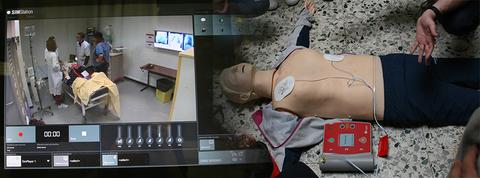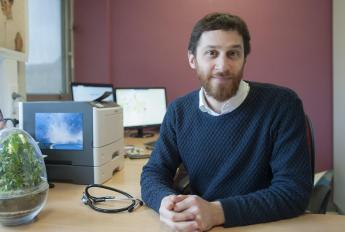
Health Simulation Teaching Department at the Sorbonne (DéESSES)
« Never the first time on a patient » is the priority objective of the Sorbonne's Département d'Enseignement par Simulation en Santé (DéESSES). A pioneering department in France in terms of initial training for this learning method, which has now become a must.

Sorbonne University's Faculty of Health Sciences has been involved in medical simulation since 2011. Initially developed by the medical team of the Pitié-Salpêtrière intensive care and emergency departments, the activity has taken on new momentum since its inception by moving to a facility entirely dedicated to simulation within the Faculty of Health Sciences' premises.
The simulation activity has been strengthened by the inclusion of teachers from other medical specialties, notably from the obstetric, surgical and paramedical teams at Pitié-Salpêtrière, Saint-Antoine and Tenon. This teaching method is based on high- and medium-fidelity simulation mannequins, enabling students to experience a realistic work environment. Medical simulation is also a tool for improving teamwork.
The simulation laboratory is currently used to train graduate and post-graduate students, as well as continuing education students, as well as externs from the faculty throughout their studies, and interns from hospitals affiliated to our university. It is also used by healthcare professionals taking part in the "Vital Emergencies" University Diploma, which uses simulation as a teaching tool.
Simulation can be used to teach a wide range of skills, from technical skills such as stitching, drain insertion and difficult intubation, to teamwork skills in life-threatening emergencies. Simulation can also be used to train future doctors in communication skills, with "simulated patients" giving them the opportunity to announce serious illnesses or, more simply, to work on the "doctor-patient" relationship. A third area of simulation currently being developed by our faculty is the use of advanced software to teach anatomy, physiology and surgical procedures. The provision of ultrasound machines also enables students to learn about the physiology of the body and to be introduced to ultrasound scanning.

A pioneering faculty in simulation training
« At Sorbonne University, we are national pioneers in the use of simulation in initial training, with a wide range of courses and a high volume of learners », says Prof. Freund. The Faculty of Health has been involved in medical simulation since 2011. Initially set up by the Pitié-Salpêtrière intensive care and emergency services team to deal with life-threatening emergencies, simulation has been developed in all specialties: intensive care, anesthesia, emergencies, exceptional health situations, pediatrics, neonatology, surgery, urology, radiology, gynecology, healthcare relationships, orthopedics, nursing, etc.
« The Faculty of Health has always been very supportive » says Yonathan Freund. « Over the years, we have obtained premises and funding to invest in and maintain the equipment. New teacher-practitioners have joined us to set up other workshops. And by 2024, we should have a new site entirely dedicated and adapted to simulation ».
